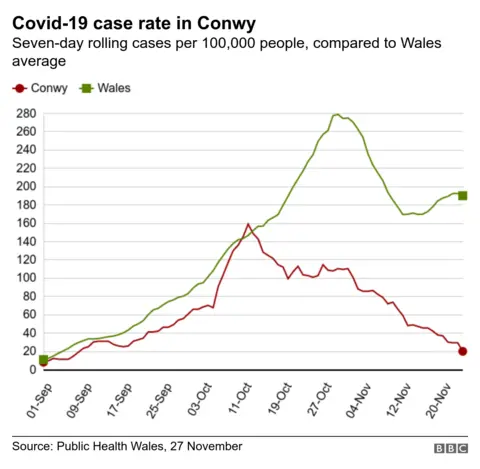Conwy council leader criticises hospitality sector rules
 Getty Images
Getty ImagesThe leader of a council with the lowest rate of Covid-19 cases in Wales has criticised national rules imposed on the local hospitality trade.
Sam Rowlands from Conwy Council said he was disappointed the first minister had adopted a national approach rather consider regional differences in cases.
A new tier system is being brought in to manage the virus in England.
On Friday, First Minister Mark Drakeford said a single set of rules made it easier for people to follow.
Conwy county has seen under 20 cases per 100,000 people in the past seven days, compared with an all Wales average of 189.8 cases per 100,000 people.
In an open letter to the first minister, Mr Rowlands highlighted his "disappointment at the announcement of an all Wales set of further restrictions to the hospitality sector" which employs 10,000 people across the county.
"There is not any significant concern with this sector as any spread of the virus we are currently seeing is through household transmission," wrote the Conservative councillor.
"I'm very disappointed to hear today that you're not looking to take into account any regional variance of the risk of the virus with restrictions you are considering in the lead up to Christmas."

Pubs, bars and restaurants had only reopened on 9 November after the Wales-wide 17-day lockdown, and currently close at 22:00 GMT.
New restrictions, which have not yet been finalised, will come into force from 4 December.
A Welsh Government spokesperson said: "Coronavirus does not respect borders, whether they are in Wales or further afield.
"We need to use the coming weeks to reduce the spread of the virus and create more headroom for the Christmas period, for the whole of Wales.
"We are very aware that the hospitality sector has worked hard to put in place measures to protect the public and we know this will be a worrying time for all working in the industry.
"However, new restrictions will need to focus on the places where we meet and where coronavirus thrives, drawing on the recent evidence from the UK Sage group of experts about what interventions have the biggest impact on the virus."
